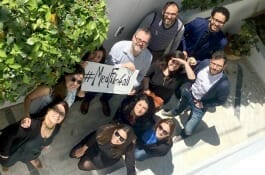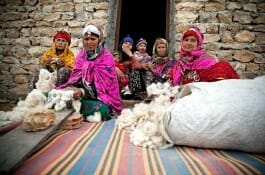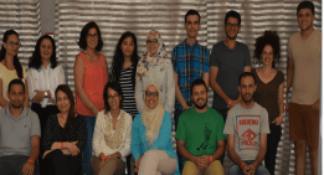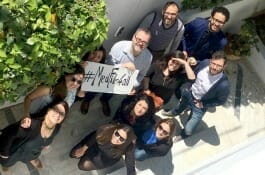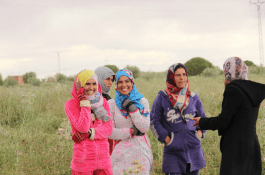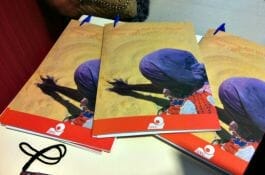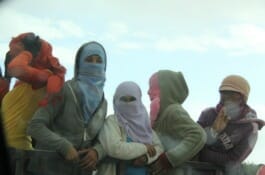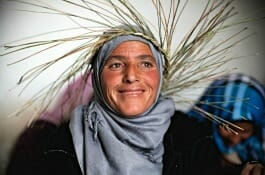
Tunisia, especially in the targeted area, is going through a complex post-revolution and transition phase, characterized by an hard economic…
Discover moreWeWorld has been in Tunisia since 2012 to support the most vulnerable groups of the communities with projects aimed at strengthening civil society, women empowerment and the inclusion of young people. Furthermore, we are committed to strengthening the social and solidarity economy and governance of the country.
Since the 2011 Jasmine Revolution, Tunisia has grappled with political and socio-economic challenges, experiencing 14 government changes in the last decade amid social tensions and sluggish economic recovery.
Economic challenges. The country faces a crisis marked by slowed growth since 2011, compounded by the COVID-19 pandemic and the Russia-Ukraine conflict. Factors like reduced productivity, excessive regulation, limited trade, investment and innovation contributed to a meager GDP growth since 2011. Meanwhile, job opportunities remained scarce and unemployment high, especially among women, youth, and graduates.
Social Disparities. Tunisia struggles with a dual exclusionary development model: socially, it marginalizes vulnerable groups through limited job stability and social assistance; geographically, it neglects inner regions, failing to implement targeted efforts to stimulate employment and improve standards of living. In 2022, unemployment in rural areas reached 15.2%, with youth and women being particularly affected by it. Women experience discrimination in employment, unequal access to jobs and substandard working conditions. Likewise, disparities between rural and urban areas continue to increase, with the highest poverty rates concentrated in the former, frequently surpassing 33%, compared to a national average of 21%.
Political Instability. Tunisia is experiencing renewed turmoil, with eroded public confidence in the government's ability to address socio-economic challenges. In response to this institutional crisis and the wave of protests, Tunisian President took decisive steps to consolidate his authority through decrees, dissolving institutions and silencing opponents. Consequently, efforts to decentralize governance have been frustrated, undermining the potential to address regional disparities and dynamize local development. Not only, civil society organizations are also in the government's crosshairs, as it is attempting to legislatively interfere with their freedom of association and, more broadly, with the safeguarding of civil rights.
We have been operating in Tunisia since 2012, with a coordination office situated in Tunis and two field offices located in Sidi Bouzid and Kébili.
Throughout the years, we have implemented projects in 15 different Governorates, with a notable focus on the regions presenting the highest level of disadvantage and limited access to services and opportunities compared to the other areas. Through our work, we have cultivated technical expertise and gained operational experience in three overarching multi-sectoral components:
Promoting Local Socio-Economic Development, through a strategy grounded in the principles of Social Solidarity Economy and aimed at fostering the socio-economic inclusion of young individuals and women. In order to foster the generation of employment opportunities in Tunisia's most disadvantaged rural regions, we enhance the capacities of local stakeholders to promote the entrepreneurial roles of men, women and young individuals. We are dedicated to facilitating the improvement of local value chains by providing support to cooperatives, startups, micro, small, and medium enterprises. This support encompasses various initiatives, such as the establishment of business incubators, local economic development agencies, guarantee funds, and the provision of microcredit, throughout the strengthening of public-private-civil society organizations combined governance. Furthermore, our efforts extend to the integration of women into non-traditional professions and the cultivation of a business culture that prioritizes gender sensitivity.
Promoting Vulnerable Groups' Rights in rural and internal areas of Tunisia, through initiatives that bolster their social protection and engage in awareness-raising efforts through informal education. On one front, we are dedicated to promoting women's rights, with projects designed to foster human development, gender equality, and combat stereotypes. Simultaneously, we are also deeply committed to safeguarding the rights of vulnerable children, whether Tunisian or non-Tunisian. This encompasses rising awareness about child protection but also training involved professionals and institutions and providing resources to child-centered facilities. Moreover, we coordinate awareness and education activities with youth aimed at preventing violent extremism and informing about the risks of irregular migration.
Support to Civil Society Organizations and Local Governance. We support Civil Society Organizations, with a particular focus on citizens, especially youth and women, by providing training to local institutions, promoting access to information for the organizations and enhancing awareness of their rights. We are committed to fostering good governance by providing expertise on the civil society organizations' rights, ensuring accountability in public administrations and local governments, and to enhancing women and youths’ active participation in political, social and economic public life.
Tunisia, especially in the targeted area, is going through a complex post-revolution and transition phase, characterized by an hard economic…
Discover moreThe project pursues the goal of creating four film clubs in the four governorates of southern Tunisia where there are…
Discover moreTunisia, following the 2011 Jasmine Spring, is going through a slow and complex democratic transition phase, characterized by important progress…
Discover moreThe instability of the political situation in Tunisia is defined by a scarce democratic participation linked to the economic disparities…
Discover moreAmong the target Countries there are many differences and different degrees between them in terms of how much and how…
Discover moreThe project is part of the activities to support the Social Economy as a driver of income generation for women…
Discover moreThe action is developed in 4 countries: Jordan, Palestine, Tunisia and Libya. The aim is to strengthen the engagement of…
Discover moreThe project is set up where it had been previously conceived, that are Moroccan and Tunisian territories. As stated by…
Discover moreThe project is deployed in all Tunisia, especially in the most disadvantaged urban and country areas of Sidi Bouzid Governorate,…
Discover more